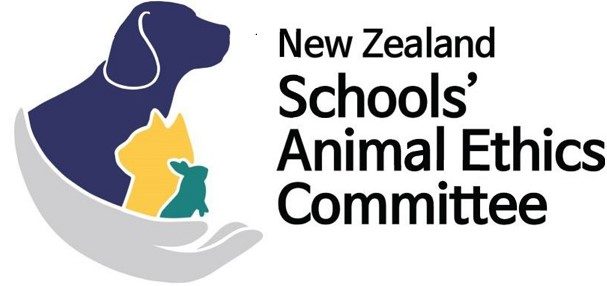Do I Need Ethics Approval?
Ethics approval is legally required under the Animal Welfare Act 1999 when live animals are to be used for teaching or research depending on what animal they are and if they are ‘manipulated’. This applies to student investigations including those for science and technology fairs, CREST Awards, NIWA Science Fairs, Bright Sparks or other student or teacher-led research or technological practice.

Evidence of ethics approval will be a prerequisite to entering a Science Fair.
Under the Animal Welfare Act ‘animal’ means any live member of the animal kingdom that is a mammal, bird, reptile, amphibian, fish (bony or cartilaginous), octopus, squid, crab (including half crab), lobster or crayfish (including freshwater crayfish), and includes any marsupial pouch young or mammalian foetus, or any avian or reptilian pre-hatched young, that is in the last half of its period of gestation or development.
The following activities do not require Animal Ethics Committee approval:
- School, classroom or student pets including pet days where appropriate animal care is given;
- Observations of body structure and function;
- Routine animal care and handling techniques including routine farm husbandry practices.
- Observations of behaviour (provided the presence of people does not interfere with normal behaviour, for example, animals giving birth are often affected by the presence of people).
Most other activities will require Animal Ethics Committee approval.
Examples of projects that require approval include:
- Observing the responses of mice to different conditions in mazes
- Observing the responses of fish to colours
- Observing a dog’s reactions to colour, music and sound
- Raising calves on different bedding
- Does your cat or dog have a preference for using their right or left paws?
Caring for chicks and observing them requires ethics approval.
- If the hatching of eggs or raising chicks is part of a teaching activity and the chicks are kept in a classroom environment then approval would need to be sought.
- Where chickens are kept outside in a fenced coop and observed with the hen, no approval is required. We advise that children do not handle the chicks without a competent staff member present to avoid injury, minimise stress and to avoid overheating.
- There is a fifty percent chance that half of the hatched chicks will be roosters. With many regional councils prohibiting the keeping of roosters, the likelihood of rehoming them to responsible forever homes is very unlikely and the consequences of this challenge are unfavourable.
Consider these options below instead:
Listed below are examples of some modern, humane alternatives that schools may like to consider as alternatives to using fertile eggs and chicks, which meet the same curriculum objectives, without cruelty:
- Virginia Tech’s “4-H Virtual Farm” Chicken Embryo Development site includes video of chick embryo development, still images, and text on the development process.
- Chick life-cycle exploration set sells a set of 21 egg replicas that show development day by day.
- Chicken Embryo Development Animation of the 21 day development of a chicken embryo in the egg.
| If you are unsure if your project requires ethics approval, contact the School’s Animal Ethics Committee for help before you start: animalethicscommittee@nzase.org.nz |
To apply for Animal Ethics approval, please complete the web form for Student’s here and Teachers here.
Kindly ensure that your application reaches the committee no later than one week before the next scheduled meeting.
Once your application has been approved you will be sent approval stickers. These are so you are able to demonstrate you have animal ethics approval and can enter into a science fair or for a science award.
Statistics Return
Immediately on completion of a student project, or the end of each year of a teacher project, it is a requirement to complete and email a Statistics Return to the Committee. This information, including the numbers and types of animals used in projects, is sent to the Ministry for Primary Industries, to contribute to annual statistics on animal use in research, teaching and testing.
Statistics Return Form Student
Statistics Return Form Teacher
Schools’ Animal Ethics Excellence Certificate
Each year, the Committee chooses a project to award the Schools’ Animal Ethics Excellence Certificate and cash prize of $100. To be eligible, projects must be well-researched, and demonstrate a good understanding of an area of animal welfare. Photos of the project (for example of the animals that were studied, in particular during the study, or of the board submitted for a science fair) must also be submitted to be eligible for the prize.
Department of Conservation permits
A Department of Conservation permit is required if your project involves catching, killing, or obtaining the eggs, dead bodies or parts, of any native mammals, birds (except game birds), reptiles or amphibians, or bush and ground wetas, ground or carab beetles, Nelson cave spiders, snails, black and red coral, or spotted black groper.
A permit may also be required to remove the remains of native species from National Parks or Reserves.
Find out more at www.doc.govt.nz
Animal Welfare
Would you like to learn how animals communicate how they are feeling, as well as their wants and their needs, with one another in a variety of ways. Their communication might be in the form of scent, sound, sight, body language, touch or even a combination of senses.
The SPCA has a range of posters on understanding the Body Language of animals.
To view and other helpful Animal Welfare related resources, please click here: https://kids.spcaeducation.org.nz/responsible-pet-ownership/animal-body-language-basics/

Do you require more information or assistance?
Please email: animalethicscommitteenz@gmail.com
